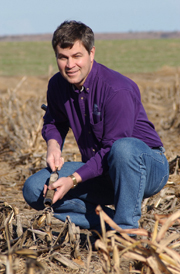K-STATE ONE OF FOUR UNIVERSITIES SHARING $20 MILLION FOR CLIMATE CHANGE, RENEWABLE ENERGY RESEARCH
 A $20 million National Science Foundation grant will further establish Kansas as an internationally recognized leader in global climate change and renewable energy research -- and will let a Nobel Prize-winning K-State scientist continue his work on the effects of climate change.
A $20 million National Science Foundation grant will further establish Kansas as an internationally recognized leader in global climate change and renewable energy research -- and will let a Nobel Prize-winning K-State scientist continue his work on the effects of climate change.
"This grant allows Charles Rice, a university distinguished professor of agronomy, and his fellow researchers to continue their important work on climate change," said Kirk Schulz, K-State president. "As K-State continues to make sustainability a campus priority, we are more proud than ever to be involved in a project on global climate change and renewable energy."
Rice was a member of the Intergovernmental Panel on Climate Change that was awarded the Nobel Peace Prize in 2007.
The five-year research award was made to Kansas NSF EPSCoR -- or Experimental Program to Stimulate Competitive Research -- a statewide program that includes major Kansas research universities and provides a fresh integrative approach to address climate change and renewable energy challenges.
The grant links K-State with the University of Kansas, Wichita State University and Haskell Indian Nations University; three Kansas-based companies: Abengoa Bioenergy, MGP Ingredients and Nanoscale; and two companies outside of the state: ADM in Illinois and Netcrystals in California.
The initiative also will be supported by $4 million in matching funds from K-State, the University of Kansas and the Kansas Technology Enterprise Corporation.
The Climate Change and Renewable Energy initiative spans a variety of disciplines, with five team leaders.
Rice will lead the group that will use climate modeling tactics to predict the effects of climate change and develop strategies for adaptation and mitigation. This portion of the project makes up about $5 million of the total funding.
About 40 scientists are currently involved in the collaborative consortium, representing a vast array of disciplines, including agronomy, anthropology, computer science, economics, geography, mathematics, sociology, engineering, biology, chemistry and physics.
EPSCoR is a federal program that targets states that have traditionally been underfunded in the sciences and engineering. For more information on NSF EPSCoR see: http://www.nsfepscor.ku.edu/.